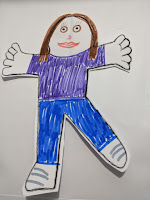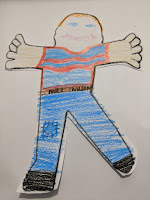RHPS Gr 1-2 Flat Traveller project
Our Gr 1-2 students wanted to know more about the world and celebrate the differences and similarities. What better way than to send out flat travellers, just like Flat Stanley [by Jeff Brown]. Since we are in lockdown and teaching and learning is being done remotely, this was a great way to still travel and see the world! And learn!
Covid-19 has changed the way we think about learning and teaching. In this project, 54 students from 5 Gr 1-2 classes at Rolling Hills Primary School, wrote to 54 hosts from around the world. They made a flat version of themselves or their teachers and this was sent off to the hosts via Australia Post.
Covid-19 meant many delays with postal services, with mail not able to be sent to hosts in Uganda, Argentina, India and Ukraine. All flat travellers and their letters were scanned and also sent via email.
Since August, our hosts from Canada, USA, Iceland, Argentina, Costa Rica, New Zealand, Australia, New Caledonia, Singapore, China, India, Switzerland, Germany, France, Poland, Ukraine, Ireland, Scotland, England and Uganda have been answering students’ questions and sending emails. Due to lockdown and remote learning, the best way to share all this information was to create a blog: https://rhpsflattraveller.blogspot.com/ and to have a weekly Flat Traveller zoom room each Friday for Gr 1-2 families to connect with each other and the Gr 1-2 teachers and learn from our hosts. The focus has been on ‘celebrating differences’ and students have been learning about what is similar and what is different from where they live and their lifestyles to where their hosts live and their lives. They wanted to know how people in other countries were coping with Covid-19 as well as life in their local neighbourhoods..
We hope to have some more zoom sessions when we return to onsite learning, however, this time, it will be our hosts from across the globe in the zoom room!
- We have been published in the Our Shared Story project:
"Flat Travellers has been featured in the latest Our Shared Story newsletter. Thank you for sharing - we hope it reaches far and wide! :) "
Letters to our hosts:
August 3rd, 2020:
Dear Flat traveller hosts,
Our Flat Traveller project is ready to go! We are still in
lockdown here in Victoria and students are learning remotely. That has made it
really hard as we are not face to face with the children. We thank the mums,
dads, grandparents and friends who have helped them make their flat travellers.
Your flat traveller is also in the post. Due to the
pandemic, we know that mail may be delayed or not even arrive. We have our
fingers crossed that you get your flat traveller soon. This is why our flat travellers are also being emailed.
If you can, we would love it if you could print your flat
traveller, cut him or her out and take around your town or city.
Included in your envelope is the attached letter from our
school, a letter from the student and some small souvenirs from Australia. The
attachments in this email are a copy just in case the mail goes missing and to
get you started.
Every Friday, the teachers are in a ‘zoom room’ and we will
share any information sent to us. Please send as many emails as you would like
to about where the flat traveller has been or about your area. E.g you might
send me an email about Flat Abbey seeing some farm animals, or visiting the
city centre or going to school, or riding public transport. This will be shared
with the 5 classes each Friday.
After you receive your envelope [and let me know if you
haven’t by 3 -4 weeks] then you can add a letter if you like and post it back
to us in Victoria, Australia. We all
love getting mail! [You have a self-addressed envelope in your package]
Dear hosts,
Thanks so much for hosting a flat traveller from Rolling
Hills Primary School.
Here is a little bit about what 2020 has looked like for us:
-
January and February – massive bushfires across the
country. Many people stuck in holiday towns and villages wiped out from fire.
Some schools in Eastern Victoria were burnt to the ground.
-
March – Corona virus [covid-19] meant that schools
stopped onsite teaching and learning before the end of term and students were
sent home and everyone in Victoria was asked to stay at home.
-
April – Start of Term Two. We started our term with
remote learning and everyone was asked to stay at home, except for essential workers,
for 5 weeks if you were in Gr Preps – Gr 2 and for 7 weeks if you were in Gr
3-6. Students returned to onsite learning for 5 and 3 weeks respectively.
-
June – Term Three holidays were extended for one week
for students. Education staff spent the week onsite planning for more remote
learning. This included planning for school open nights, information nights,
parent teacher conferences, mid year reports etc.
-
July – it’s time to send our flat travellers around the
world.
We have been having a lot of zoom meetings with our
students. This is what our Grade 1-2 students want you to know about us
[brainstormed in a zoom]:
-
School starts at the end of January, which is summer
and this is called Term One.
-
We have 4 terms each year. Each term goes for about 10
weeks. Then we have term holidays which are 2 weeks. Term One holidays include
Easter. We finish in late December for Christmas and Summer holidays before
coming back to school in late January.
-
Children can go to kinder for 2 years and then start
Preps at age 5 or 6. Primary School goes to Gr 6 and then we go to Secondary
School.
-
We have 5 classes of students in Grade 1 and Grade 2.
Grade 1 students turn 7 in the year and Grade 2 students turn 8, usually. We
have around 24 students in each class.
-
Our school is called Rolling Hills Primary School. We
are in the Outer Eastern suburbs of Melbourne. Our school has 370 students.
-
Ms Moore is our Assistant Principal and she loves to
travel. Mr Bradley is the Principal. Our class teachers are Mrs. McCann, Miss
Hartrick, Miss Cairns, Mrs Creed, Mrs Cripps and Mr Wilson. Our Education
Support Officers [integration aides] that support Gr 1-2 classes are Mrs
Kilner, Mrs Donnelly, Mrs Walton, Mrs Plunkett, Mrs Coxhill, Mrs Cornwall. Our
Art teacher is Mrs Granger, PE is Ms Minton and Performing Arts is Mrs
Harrison.
Some of our Flat travellers are sending themselves and
others are sending the teachers. Every Friday we have a special Flat Traveller
zoom room to share stories about the project. We can’t wait to hear from all
our hosts.
Please can you send our flat travellers back with
information about your life, town, and country?
You can email Ms Moore at mary.moore@education.vic.gov.au
and then send us back in the mail.
We will be sharing with a big display. We are very grateful
that we can still do this project from lockdown and hope that we are back at
school soon.
|
Our Country: Australia Australia is a big island continent and has many landscapes. The highest mountains [which aren’t
very high really] are part of the Great Dividing Range that goes from Cape
York at the top to our state – Victoria – in the south. Even though Australia is a pretty big country, most of the people live around the coastal towns.
There is a big desert called the Outback in the middle of Australia which is pretty arid and not that many people live there. Australia is a multicultural country which means people from all around the world can live here. There are more than
130 species of marsupials, such as kangaroos, koalas, and wombats. The famous
Healesville Sanctuary is nearby, about half an hour away. It has a wildlife hospital for Australian animals that need medical treatment and has a special platypus display. Australia became
independent on January 1 in 1901. |
|||
|
Australia Flag and Fast Facts |
|
|||
|
|
Population Capital Area Language Religion |
Currency Life Expectancy GDP per Capita Literacy Percent |
|
|
|
|
The Yarra Valley is about an hour’s drive
north-east of Melbourne. The Yarra Valley is not a town, it is a tourism
sub-region. Many of our students live in the Yarra Valley or the Yarra
Ranges. |
|
What's there to do? |
|
The Yarra Valley is one of Australia’s
premium wine regions - it has long been producing wine, but the since the
1980s the region has grown rapidly, not only in sales but also in the realms
of taste and range. Sparkling wines, chardonnays, pinot noirs and cabernets
are some of the Yarra Valley’s signature wines. There are more than 50
wineries in the region, many with cellar door sales and tasting. An excellent
time to visit is early March, when the two-day long Grape Grazing Festival
takes place. |
Our school in at the
beginning of the YARRA VALLEY
Our school is in MOOROOLBARK:
We
respectfully acknowledge the Wurundjeri People of the Kulin Nation as the
traditional custodians of this land and pay our respects to their elders, past,
present and emerging.
Mooroolbark is an outer eastern
suburb of Melbourne. We are in the Shire of Yarra Ranges. The population of
Mooroolbark is 21,967. You can see the Yarra Ranges from our school.
Our school is located in the
rolling hills of Mooroolbark and is 36 years old. There are 17 classrooms, an Art Room, a library, a gym, a Performing Arts room, basketball court, oval, downball courts, veggie garden and lovely outdoor learning spaces.
Our school has 3
parts – the main building, the Boorai Buidling and the William Barak Centre.
Boorai is an aboriginal word for children and William Barak was an aboriginal
elder in our area’s history.













